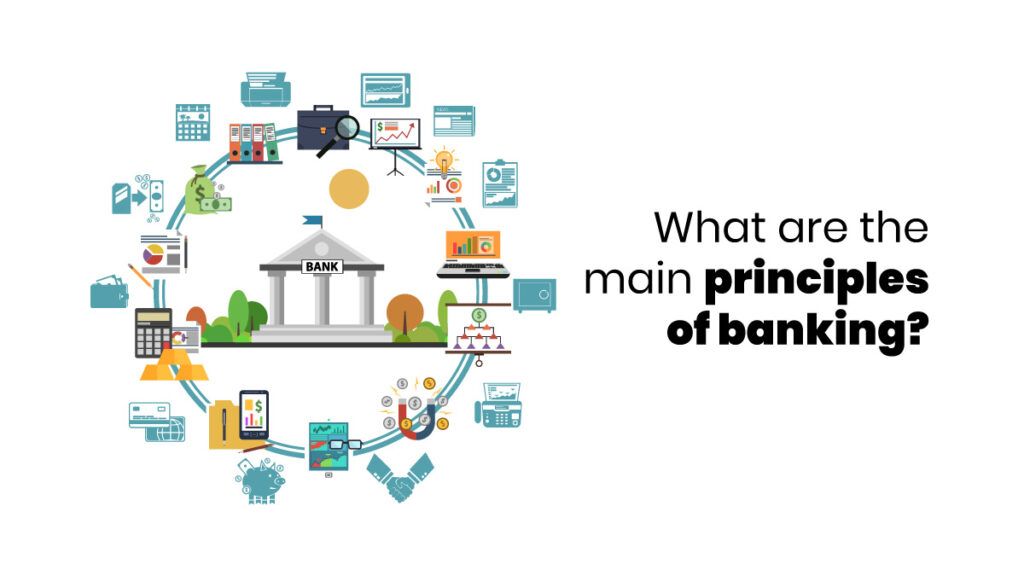The financial world is a complex web that relies on banking principles to maintain stability and functionality. Banking is not just about transactions but also about trust, responsibility, and effective financial management. In this blog, we will explore the main principles of banking, explaining their significance and how they contribute to the seamless operation of this vital industry.
Ensuring Safety and Reliability
The foundation of every banking system lies in the unwavering commitment to safety and reliability. Banks are responsible for safeguarding their customers’ funds and investments. Collaborating closely, regulatory bodies and financial institutions establish resilient systems that guarantee the stability and trustworthiness of the banking sector. Essential practices, including prudent lending, effective risk management, and strict adherence to regulations, are pivotal in upholding banks’ safety and reliability standards.
Maintaining Liquidity
Liquidity is a vital principle that ensures a bank can meet its short-term responsibilities. Banks must carefully manage the balance between what they own (assets) and owe (liabilities) to ensure they can handle withdrawal requests and other financial commitments. Working this balance strategically helps prevent liquidity crises, contributing to the overall strength of the financial system.
Balancing Profitability
While banks are responsible for handling people’s money, they are also businesses aiming to profit. Profitability is a fundamental principle that allows banks to sustain their operations, invest in technology, and expand their services. Striking the right balance between making profits and offering valuable services to customers is a delicate but essential aspect of banking.
Practising Prudence
The principle of prudence emphasises careful decision-making in banking operations. Banks must thoroughly assess risks, make well-informed lending decisions, and keep enough reserves to absorb potential losses. Practising prudence is a protective measure against risky financial practices, contributing to the long-term success of banks.
Upholding Customer Confidentiality
Trust is the foundation of banking, and customer confidentiality is fundamental to building that trust. Banks are obligated to keep their customers’ financial information private and secure. This commitment to privacy builds confidence among customers, creating a strong and lasting relationship between banks and the people they serve.
Embracing Diversification
To minimise risks and adapt to changing economic conditions, banks follow the principle of diversification. This involves spreading investments across different sectors and industries. By diversifying their portfolios, banks can reduce the impact of economic downturns on their overall financial health, promoting resilience in the face of uncertainties.

Prioritising Transparency and Disclosure
Transparency is one of the crucial principles of banking that strengthens trust between banks and their stakeholders. Financial institutions must provide clear and comprehensive information about their operations, financial health, and risk exposures. Transparent practices enhance accountability, allowing customers and regulators to make informed decisions and keep loyalty in the banking system.
Fostering Innovation
In today’s swiftly evolving financial landscape, banks must welcome innovation wholeheartedly. This entails incorporating new technologies and practices to elevate their services, boost efficiency, and cater to the ever-changing needs of their customers. Through this commitment to innovation, banks position themselves to stay competitive and resilient in a dynamic market, ultimately contributing to the overall growth and advancement of the industry.
Promoting Financial Inclusion
Banks are vital in promoting financial inclusion by providing access to banking services to diverse individuals and businesses. This involves creating products and services that meet underserved populations’ needs, fostering economic growth and inclusivity.
Sticking to Ethical Standards
Maintaining ethical standards is one of the fundamental concepts in banking. Banks must conduct their operations with integrity, honesty, and fairness. Sticking to ethical standards helps to build trust among customers, employees, and the broader community, reinforcing the positive impact of banking on society.
Both banking professionals and the general public must understand the main principles of banking. These principles act as the foundation that supports the integrity, stability, and functionality of the banking sector. As the financial landscape develops, understanding these principles can provide a valuable understanding of the essential factors contributing to the banking industry’s resilience and trustworthiness.
Are you aspiring to excel in bank exams and reach new heights of success? Look no further than Finprov’s Bank Exam Coaching. Our comprehensive and practical approach serves as your reliable companion in achieving your goals. Our curriculum covers critical areas such as quantitative aptitude, reasoning, English language proficiency, general awareness, and in-depth banking topics. By learning these topics helps learners to get the highest banking jobs in India. What sets us apart is our flexibility. Whether you prefer the classroom setting or the convenience of online learning, our coaching programs are designed to accommodate your preferences. Recognizing that every student is unique, we tailor our approach to meet your needs.
Beyond the basics, our program includes carefully crafted study materials, well-structured test series, and interactive doubt-clearing sessions. We are committed to empowering your journey, helping you strengthen your skills, and excel in bank exams. Finprov’s Bank Coaching in Kochi gives you access to the necessary tools and guidance to thrive in your pursuit of excellence.




















